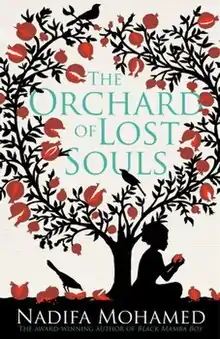The Orchard of Lost Souls
The Orchard of Lost Souls is a 2013 novel by the Somali-British author Nadifa Mohamed. It is set in Somalia on the eve of the civil war.[1] Her second book, coming four years after her award-winning debut work Black Mamba Boy (2009), it was published by Simon & Schuster.[2][3]
 First edition | |
| Author | Nadifa Mohamed |
|---|---|
| Country | United Kingdom |
| Language | English |
| Genre | Historical novel |
| Publisher | Simon & Schuster |
Publication date | September 2013 |
| Media type | Print (hardback) |
| Pages | 352 pp (1st hardcover edition) |
| ISBN | 9781471115295 |
Reviewing The Orchard of Lost Souls in The Independent, Arifa Akbar said: "If Mohamed's first novel was about fathers and sons ... this one is essentially about mothers and daughters."[4] Aminatta Forna wrote in The New York Times: "In both 'Black Mamba Boy' and 'The Orchard of Lost Souls,' Nadifa Mohamed — generationally at a remove from the events she describes — shows how the echo of war reverberates down the generations, and why every nation needs its storytellers: someone to, if not make sense of events, then order them so that sense may be drawn."[5]
Awards
In 2014 The Orchard of Lost Souls won the Somerset Maugham Award and was longlisted for the Dylan Thomas Prize.[6][7]
References
- Jaggi, Maya, "The Orchard of Lost Souls by Nadifa Mohamed – review. The Betty Trask award winner takes on a complex history of Somalian civil unrest with a focus on women", The Guardian, 14 September 2013.
- "The Orchard of Lost Souls". The Lady. Retrieved 26 August 2013.
- Akbar, Arifa (17 August 2013). "Mothers and Daughters at War in the Cracked Horn of Africa". The Independent. Archived from the original on 26 August 2013. Retrieved 26 August 2013.
- Akbar, Arifa, "Book review: The Orchard of Lost Souls, By Nadifa Mohamed", The Independent, 16 August 2013.
- Forna, Aminatta, "Daughters of Revolution", The New York Times, 21 March 2014.
- Nadifa Mohamed page at The Guardian.
- "Dylan Thomas Prize: Swansea University reveals longlist", BBC News, South West Wales, 22 July 2014.
